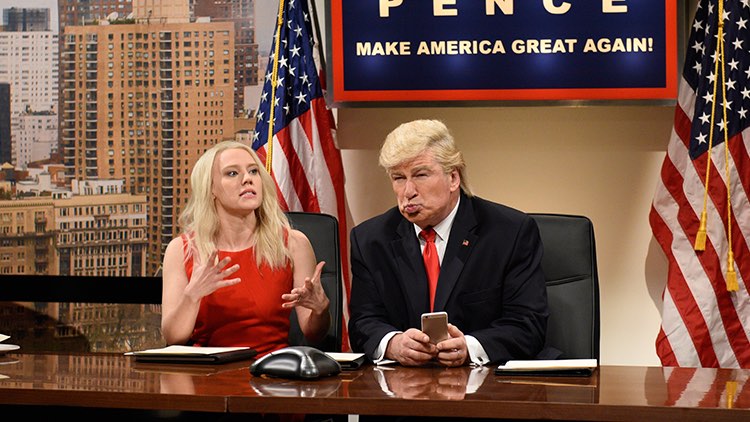As Things Get Stranger, We Seek Comfort On TV

The smarter way to stay on top of broadcasting and cable industry. Sign up below
You are now subscribed
Your newsletter sign-up was successful
Donald J. Trump is the news story of 2017, and his supersize presence may just dominate the entertainment world as well. One likely influence on original content is more comfort-food programming—big, broad series with familiar elements that help us escape the reminders of this divided nation.
The first sign may have been Netflix’s Stranger Things—the way it captured the imagination of much of America, and brought us back to a more innocent time when kids rode bikes without their parents worrying (until, of course, a boy gets abducted by an unseen creature). Coincidence or not, the show took off as Trump’s political star was skyrocketing. Season two arrives this year.
Trump will continue to be juicy red meat for Saturday Night Live, which has ridden the incoming president to watercooler relevance with Alec Baldwin’s pouty takedown.
“It’s in their sweet spot,” says Dr. Jeffrey Jones, director of the Peabody Awards, who’s written extensively about satire. “It’s good for ratings, and Trump does not like it.”
‘Net’ Effect
Back to Netflix. The streaming giant has already reengineered, perhaps permanently, the way we watch TV. Netflix plans to air 1,000 original hours this year, more than doubling its 2016 output. There’s a $6 billion budget behind that ambitious plan.
But is this the year Netflix starts acting like a traditional TV network, nurturing shows it sees as potential blockbusters and whacking the ones that don’t cut it? The network killing costly Marco Polo late in 2016 might be an indication of how Netflix conducts its programming affairs in 2017.
The smarter way to stay on top of broadcasting and cable industry. Sign up below
“They spend and spend—there has to be a point where that starts to stop,” says Myles McNutt, TV critic at The A.V. Club and assistant professor of communication at Old Dominion. “They have to have opinions on their own programming.”
The new year could mean a shaping, perhaps overdue, of the Netflix brand. “They try to be all things to all people, all the time,” says veteran programming exec Garth Ancier. “They’re the Macy’s of video.”
Streaming will continue to be pervasive. Amazon has a big presence at the Golden Globes, with Mozart in the Jungle seeking to repeat best comedy honors, and Transparent looking to unseat it. Yet Amazon Studios has realized that budgets are not bottomless. Sure, it lured Woody Allen to television, but critics didn’t care a whit for Crisis in Six Scenes. More than a few critics liked Good Girls Revolt, but Amazon spiked it anyway.
Hulu, for its part, ventures into live streaming in 2017.
CBS ‘All’ In
Buzz around Star Trek: Discovery is otherworldly, but CBS All Access folks can only hope the hype sustains itself up to Trek’s (delayed) May launch. In the nearer term, Good Wife spinoff The Good Fight will have to be a self starter when it launches Feb. 19.
But full credit to CBS, the lone Big Four player not behind Hulu, for boldly going headlong into streaming. Credit too to sibling The CW, whose deal with Netflix to air CW series eight days after the season wraps may change how network execs decide to pull the plug on Nielsen-deficient shows.
A Few Good Shows
Elsewhere in broadcast land, NBC’s got a hit with This Is Us, but there’s not much else to boast of. The live musical trend has clearly lost its novelty; NBC tries live, but not musical, with A Few Good Men. On the bright side, few broadcast series have been bad enough to be outright killed.
A vexing problem for broadcast ties back to Netflix altering the viewing experience—who sits through commercials anymore? Even if they’re watching live TV, a commercial break is a chance to text, to check your fantasy football team, to buy stuff on Amazon. One broadcast vet says ad buyers are essentially buying radio spots at TV prices.
Yet even in their diminished state, the broadcast networks have enviable reach in this fragmented universe. Many believe the NFL’s ratings slump is temporary; next month’s Super Bowl should be a good measure of the game’s continued mega-draw.
“Broadcast will never be what it was,” says former Fox exec Preston Beckman, “but the networks are always one hit away from turning things around.”
Michael Malone is content director at B+C and Multichannel News. He joined B+C in 2005 and has covered network programming, including entertainment, news and sports on broadcast, cable and streaming; and local broadcast television, including writing the "Local News Close-Up" market profiles. He also hosted the podcasts "Busted Pilot" and "Series Business." His journalism has also appeared in The New York Times, The L.A. Times, The Boston Globe and New York magazine.

